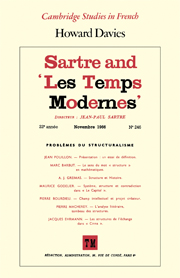Book contents
- Frontmatter
- Contents
- GENERAL EDITOR'S PREFACE
- Preface
- Acknowledgements
- Introduction
- 1 The first six years: the participation of Leiris and Lévi-Strauss
- 2 From 1951 to 1956: the rise of structuralism
- 3 Algeria: intellectual rivalries in time of war
- 4 The critique of academic knowledge
- Conclusion
- Appendix 1 Composition of the Editorial Board
- Appendix 2 Circulation figures
- Appendix 3 Categories of material to be found in Les Temps Modernes
- Appendix 4 Articles pertaining to academic anthropology
- Appendix 5 Special issues
- Notes
- Select bibliography
- Name index
- Subject index
- Cambridge Studies in French
3 - Algeria: intellectual rivalries in time of war
Published online by Cambridge University Press: 05 February 2012
- Frontmatter
- Contents
- GENERAL EDITOR'S PREFACE
- Preface
- Acknowledgements
- Introduction
- 1 The first six years: the participation of Leiris and Lévi-Strauss
- 2 From 1951 to 1956: the rise of structuralism
- 3 Algeria: intellectual rivalries in time of war
- 4 The critique of academic knowledge
- Conclusion
- Appendix 1 Composition of the Editorial Board
- Appendix 2 Circulation figures
- Appendix 3 Categories of material to be found in Les Temps Modernes
- Appendix 4 Articles pertaining to academic anthropology
- Appendix 5 Special issues
- Notes
- Select bibliography
- Name index
- Subject index
- Cambridge Studies in French
Summary
The third period runs from September 1956 to September 1963 and is bounded by the assessment of Lévi-Strauss by Pouillon, which I have just discussed, and another, conducted this time by the Sartrean philosopher Pierre Verstraeten. Between the two dates come the anti-Stalinist commitment, which is renewed after the Soviet invasion of Hungary, the continuing movement of Pontalis towards Lacan, the death of Merleau-Ponty and, most important of all, the Algerian War. Great tension is generated by the contrast between Sartre's clamorous anti-colonialism and the troubled silence of structuralism in respect of events in North Africa. It is possible to identify three moments in the relationship between the two anthropological ventures: Sartre's attack on academic anthropology, his progressive rethinking of the synthetic anthropology and the subsequent structuralist riposte. In this chapter I propose to examine each of these moments.
By way of introduction, however, I shall comment briefly on the profile of TM in this period. Its interest in politics and the sciences humaines holds steady, something which is to be expected given the context outlined above and given that its Director throws himself during these years into the extraordinarily intense labour required by his Critique de la raison dialectique. Literature, equally unsurprisingly, suffers a further slight decline in terms of the quantitative measures of its presence, as I indicate in Appendix 3.
- Type
- Chapter
- Information
- Sartre and 'Les Temps Modernes' , pp. 75 - 135Publisher: Cambridge University PressPrint publication year: 1987



